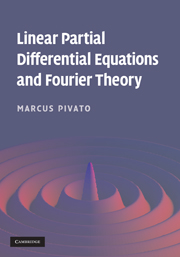Book contents
- Frontmatter
- Contents
- Preface
- What's good about this book?
- Suggested 12-week syllabus
- Part I Motivating examples and major applications
- Part II General theory
- Part III Fourier series on bounded domains
- Part IV BVP solutions via eigenfunction expansions
- Part V Miscellaneous solution methods
- Part VI Fourier transforms on unbounded domains
- Appendix A Sets and functions
- Appendix B Derivatives – notation
- Appendix C Complex numbers
- Appendix D Coordinate systems and domains
- Appendix E Vector calculus
- Appendix F Differentiation of function series
- Appendix G Differentiation of integrals
- Appendix H Taylor polynomials
- References
- Subject index
- Notation index
Part V - Miscellaneous solution methods
Published online by Cambridge University Press: 05 June 2012
- Frontmatter
- Contents
- Preface
- What's good about this book?
- Suggested 12-week syllabus
- Part I Motivating examples and major applications
- Part II General theory
- Part III Fourier series on bounded domains
- Part IV BVP solutions via eigenfunction expansions
- Part V Miscellaneous solution methods
- Part VI Fourier transforms on unbounded domains
- Appendix A Sets and functions
- Appendix B Derivatives – notation
- Appendix C Complex numbers
- Appendix D Coordinate systems and domains
- Appendix E Vector calculus
- Appendix F Differentiation of function series
- Appendix G Differentiation of integrals
- Appendix H Taylor polynomials
- References
- Subject index
- Notation index
Summary
In Chapters 11–15, we saw how initial/boundary value problems for linear partial differential equations could be solved by first identifying an orthogonal basis of eigenfunctions for the relevant differential operator (usually the Laplacian), and then representing the desired initial conditions or boundary conditions as an infinite summation of these eigenfunctions. For each bounded domain, each boundary condition, and each coordinate system we considered, we found a system of eigenfunctions that was ‘adapted’ to that domain, boundary conditions, and coordinate system.
This method is extremely powerful, but it raises several questions as follows.
(1) What if you are confronted with a new domain or coordinate system, where none of the known eigenfunction bases is applicable? Theorem 15E.12, p. 353, says that a suitable eigenfunction basis for this domain always exists, in principle. But how do you go about discovering such a basis in practice? For that matter, how were eigenfunctions bases like the Fourier–Bessel functions discovered in the first place? Where did Bessel's equation come from?
(2) What if you are dealing with an unbounded domain, such as diffusion in ℝ3? In this case, Theorem 15E.12 is not applicable, and in general it may not be possible (or at least, not feasible) to represent initial/boundary conditions in terms of eigenfunctions. What alternative methods are available?
[…]
- Type
- Chapter
- Information
- Linear Partial Differential Equations and Fourier Theory , pp. 357 - 358Publisher: Cambridge University PressPrint publication year: 2010



